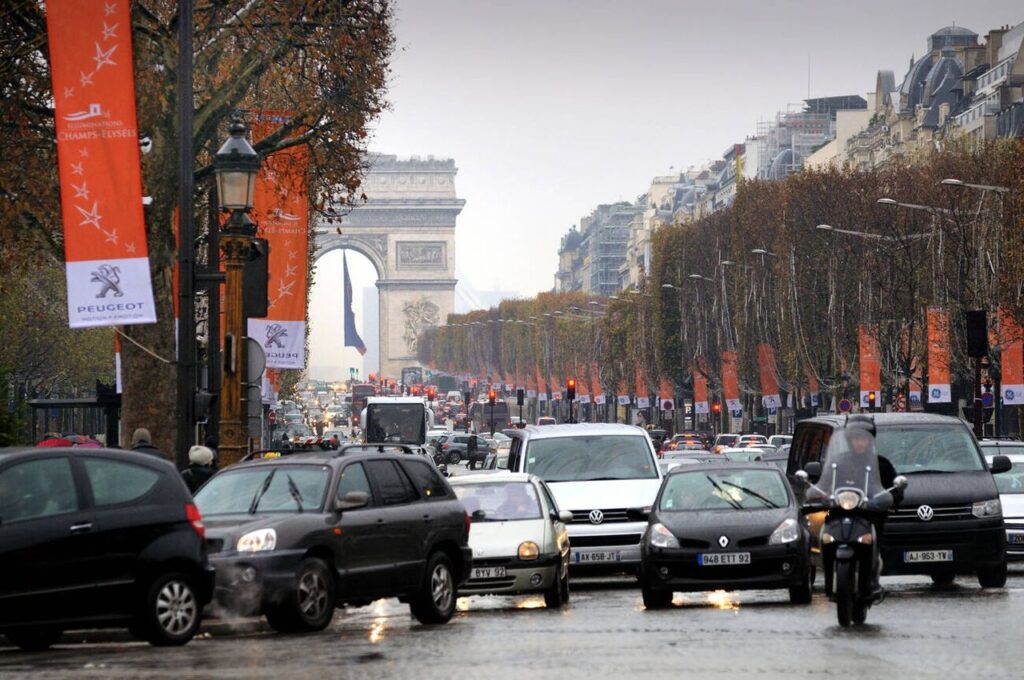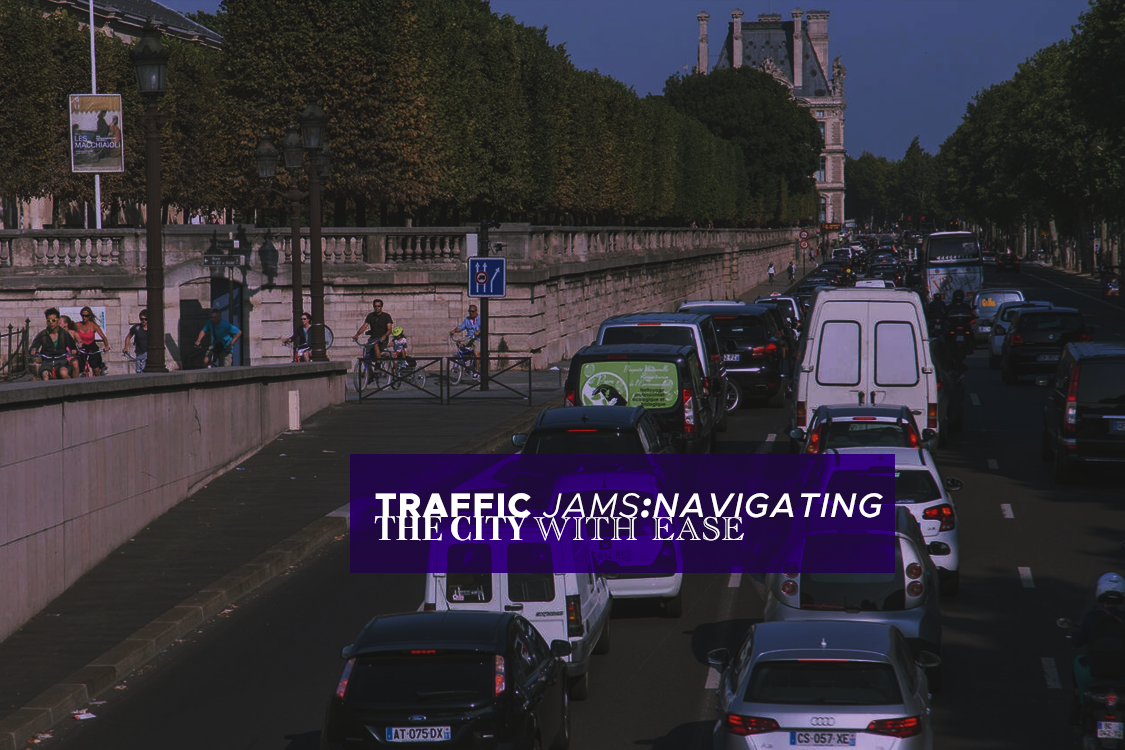In the heart of Paris, the pulsating rhythm of the city often comes to a standstill, entangled in the web of its infamous traffic jams. As we approach 2024, the situation on the streets of Paris presents a compelling narrative of challenge and adaptation. This article delves into the intricacies of navigating traffic jams in Paris, armed with data, insights, and practical advice to transform your Parisian commuting experience from frustrating to manageable.
Understanding Paris Traffic: A 2023 Overview
The landscape of Paris traffic is a complex one, marked by its peak rush hours and notorious bottlenecks. In 2023, the average time to drive 10 km in Paris escalated to 26 minutes and 30 seconds, a slight increase from the previous year. This statistic underscores the growing congestion in the city, particularly during the worst times for travel: from 4 pm to 7 pm daily, and 8-9 am on workdays.
A standout statistic from 2023 revealed that the most challenging day to navigate Paris was a Wednesday in March, with a 10 km journey averaging 33 minutes and 40 seconds. Thursdays, especially between 5 PM and 6 PM, proved to be the worst for rush hour, with a mere 2 km drive taking an average of 7 minutes and 32 seconds.
Paris Traffic by the Numbers: A Deeper Dive
Paris’s traffic scenario presents a vivid tableau of urban movement, marked by its rhythms and fluctuations. Here are some key facts and figures that paint a clearer picture:
- Average Commute Time Increase: In 2023, the average time to drive 10 km in Paris was 26 minutes and 30 seconds, marking a 20-second increase from 2022.
- The Toughest Day on the Road: The worst day for traveling through Paris in 2023 fell on a Wednesday in March, with a 10 km drive taking an average of 33 minutes and 40 seconds.
- Weekly Rush Hour Peak: Thursdays between 5 PM and 6 PM were identified as having the worst rush hour traffic, with a 2 km drive taking approximately 7 minutes and 32 seconds.
The Cost of Commuting: How Much for Traffic Jams in Paris?
Yes, it’s not for tourists, but let’s break the costs! Just with one day in a week, commuters could save up to 10 hours, 37 EUR, and 44 kg of CO2 emissions annually. Extending no car days to three days a week amplifies these savings to 31 hours, 111 EUR, and 132 kg of CO2 emissions.
Traffic Jams in Paris: Overview of Tips for Tourists
Key Strategies to Avoid Paris Traffic
Adopting strategic approaches can significantly mitigate the impact of traffic on your Parisian travels. Here are top recommendations:
- Optimal Travel Times:
- Morning: Before 8 AM
- Evening: After 7 PM
- Weekends: Early mornings are generally less congested.
Rethinking Car Rentals
For those considering driving in Paris, a word of caution: it’s not recommended. The city’s dense traffic and complex navigation can turn driving into a daunting task. For day trips, a practical alternative is renting a car from locations just outside the Périphérique, aiming for an early departure to avoid peak traffic times.
Real-Time Traffic Insights
Leveraging real-time traffic information can significantly enhance your commuting strategy. Platforms like Sytadin and the TomTom Traffic Index provide up-to-the-minute updates on Paris traffic conditions, including the ability to calculate the cost of driving during rush hour.
Navigational Aids
Waze: Your Commuting Ally
Waze stands out as a community-driven navigation app, offering real-time road alerts and traffic conditions. It’s particularly effective once you’re on the Périphérique, guiding you through or around congestion with sometimes unexpectedly creative routes.
GO Navigation App
Another invaluable tool is the GO Navigation App, known for its accuracy and user-friendly interface. Like Waze, it becomes a crucial aid outside the city’s core, helping you avoid the most congested areas.

What Tourists Should Know About Navigating Paris Traffic Jams
For tourists planning to explore the enchanting streets of Paris, understanding the dynamics of local traffic jams is crucial to ensure a smooth and enjoyable experience. Paris, with its historical allure and modern vibrancy, can also present a challenging maze of congestion for the unprepared traveler. Here are essential tips and insights tourists should arm themselves with:
- Peak Traffic Hours to Avoid: If you’re planning to use a taxi or rent a car, be mindful of the city’s rush hours, typically from 4 PM to 7 PM on weekdays and 8 AM to 9 AM on workdays. Planning activities around these times can significantly reduce travel stress.
- Public Transportation is Your Ally: Paris boasts an extensive and efficient public transport system, including metros, buses, and trams, that can often bypass the surface-level traffic jams. Familiarize yourself with the RATP app for real-time schedules and route planning.
- Experience Paris on Foot or Bike: Many of Paris’s most iconic sights are within walking distance of each other. Opting for a leisurely stroll or taking advantage of the city’s bike-sharing system, Vélib’, can provide a more intimate and flexible exploration experience, free from the constraints of traffic.
- Day Trip Strategies: For those considering day trips to locations outside Paris, consider starting your journey from a car rental location on the outskirts of the city to avoid getting caught in traffic. Early mornings are ideal for departures.
- Stay Informed with Real-Time Traffic Apps: Apps like Waze and the GO Navigation App can be invaluable for tourists, offering real-time traffic updates and alternative route suggestions to help navigate around jams.
- Local Insights: Don’t hesitate to ask locals for advice. Parisians are well-acquainted with the rhythms of their city and can often provide tips on the best times to travel or alternative modes of transport.
Don’t Miss The Best Tours in Paris
Conclusion: Traffic Jams in Paris
The streets of Paris in 2024 continue to challenge commuters with their capricious flows and congestions. However, armed with the right information, strategic planning, and modern technology, navigating through the City of Lights can become less of a trial and more of a manageable part of daily life. By rethinking our commuting strategies and adopting a more flexible approach to travel, we can all contribute to a smoother, more efficient Paris.
If You Liked Our Article About Traffic Jams in Paris, You Also Might Like
- Traffic Jams in Paris 2024: Navigating the City with Ease
- Tax-Free in Paris: How to Get VAT Refund in France 2024
- Exactly How Many Days in Paris? Plan Your Trip (2024)
- Visiting Paris as an American: Safety, Rules, Things to Know 2024
- Paris in March: Weather, What to Do, Eat & Wear 2024
- Paris in April: The Ultimate Traveler’s Guide
- Paris in February: Weather, Events, What to Wear & Eat 2024
- Layover in Paris: Things to Do, Available Time & Tours (2024)
- How to Avoid Pickpocketing in Paris: Save Your Things and Phone (2024)
- Best Time to Visit Paris by Month: Weather, Budget, Crowds (2024)
Don’t Miss The Best Tours in Paris
